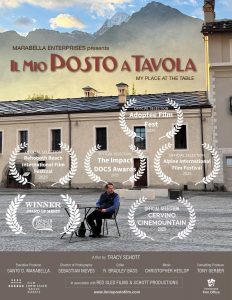The film “Il Mio Posto a Tavola” Sheds Light on “Baby Scoop” Era

Movie poster
When Santo D. Marabella was four years old, his parents Anna and Samuel told him they had something important to tell him.
“They told me I was adopted,” said Marabella, DSW, MBA, who is a member of the National Association of Social Workers (NASW). “They sat me down and told me they always wanted to have children but were not able to have children of their own and that I was special.”
Marabella said all he asked was whether they were going to give him back. “No, no,” he parents answered.
So he went back out to play and didn’t think too much about being adopted until he became a teenager and began to wonder about his origins. These feelings intensified when his adoptive parents died at the start of the pandemic and he lost a beloved dog in 2023.
His journey to find his birth family is now highlighted in the documentary, “Il Mio Posto a Tavola” or “My Place at the Table.”

Santo Marabella, MBA, DSW
Marabella, who lives in Reading, PA, made the film in partnership with another social worker and filmmaker Tracy Schott, whose documentary “Finding Jenn’s Voice” explored the murder of pregnant women by their intimate partners.
He discovered he was born in Italy and was part of the “Baby Scoop Era” of 1950 to 1970 when the Catholic Church put children born out of wedlock up for adoption, often in foreign countries.
Other nations besides Italy, including Great Britain, Belgium, Ireland, Spain and Australia, carried out similar adoption practices.
Birth contol was not so readily available during this period and there was a greater stigma in having a child born outside of marriage. The Catholic Church also coerced or shamed mothers into putting their babies up for adoption.
Marabella said he hopes the film will educate the public about the “Baby Scoop Era” and put attention on continued flaws in the adoption system. For instance, he is still fighting to get personal information from his adoption records.
“Adoption is a gift, but also the biggest challenge in the lives of adopted people… At least it has been for me,” he said.
Learn more about the role that social workers play in adoption and foster care at NASW “Help Start Here” website and the Child Welfare section on NASW’s website.
| Leave A Comment

